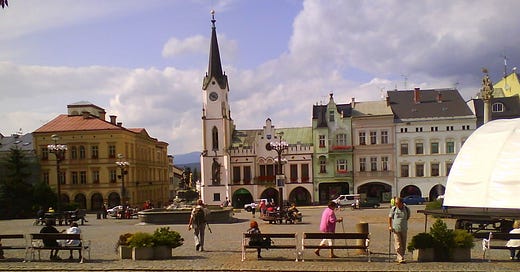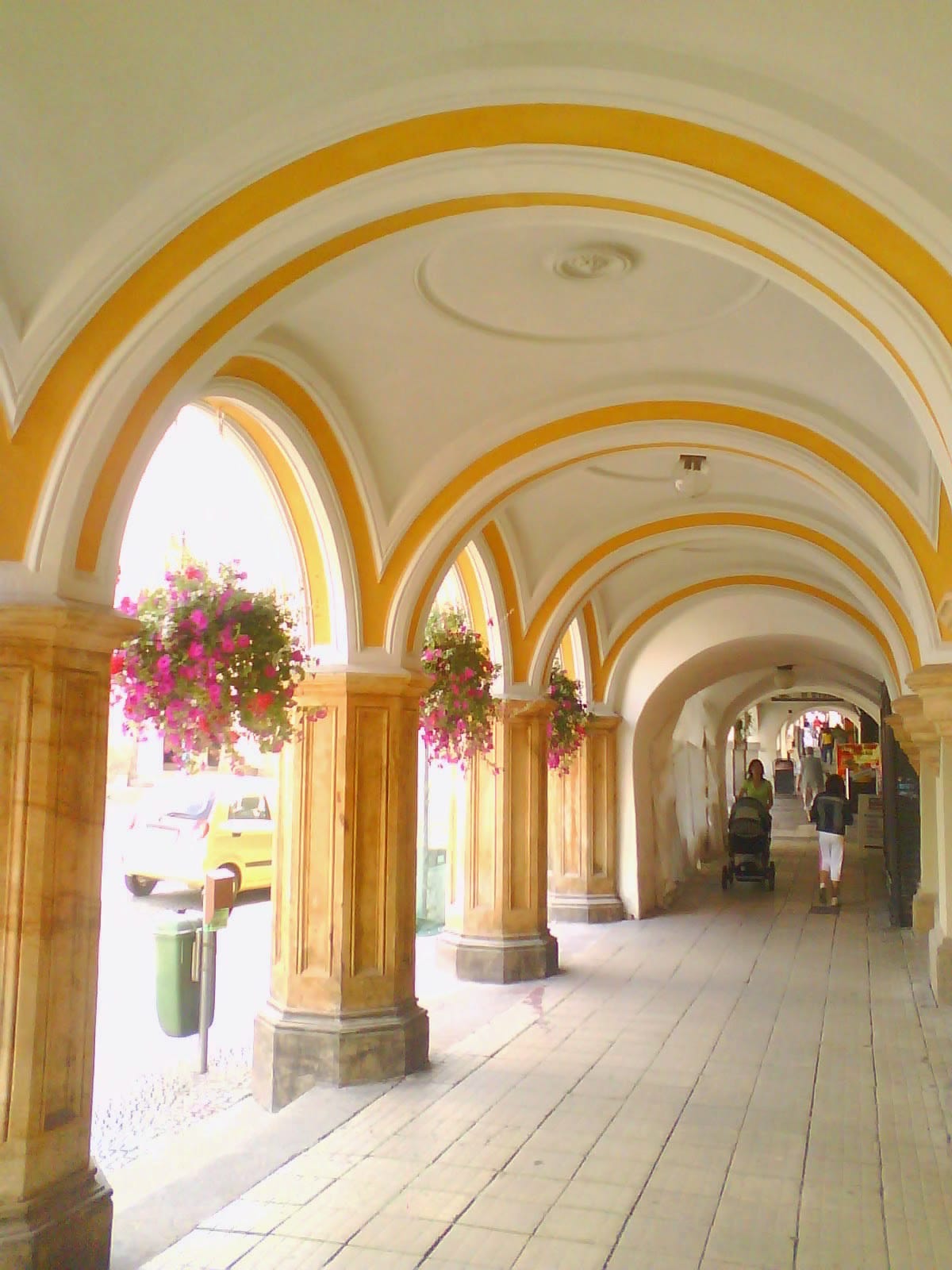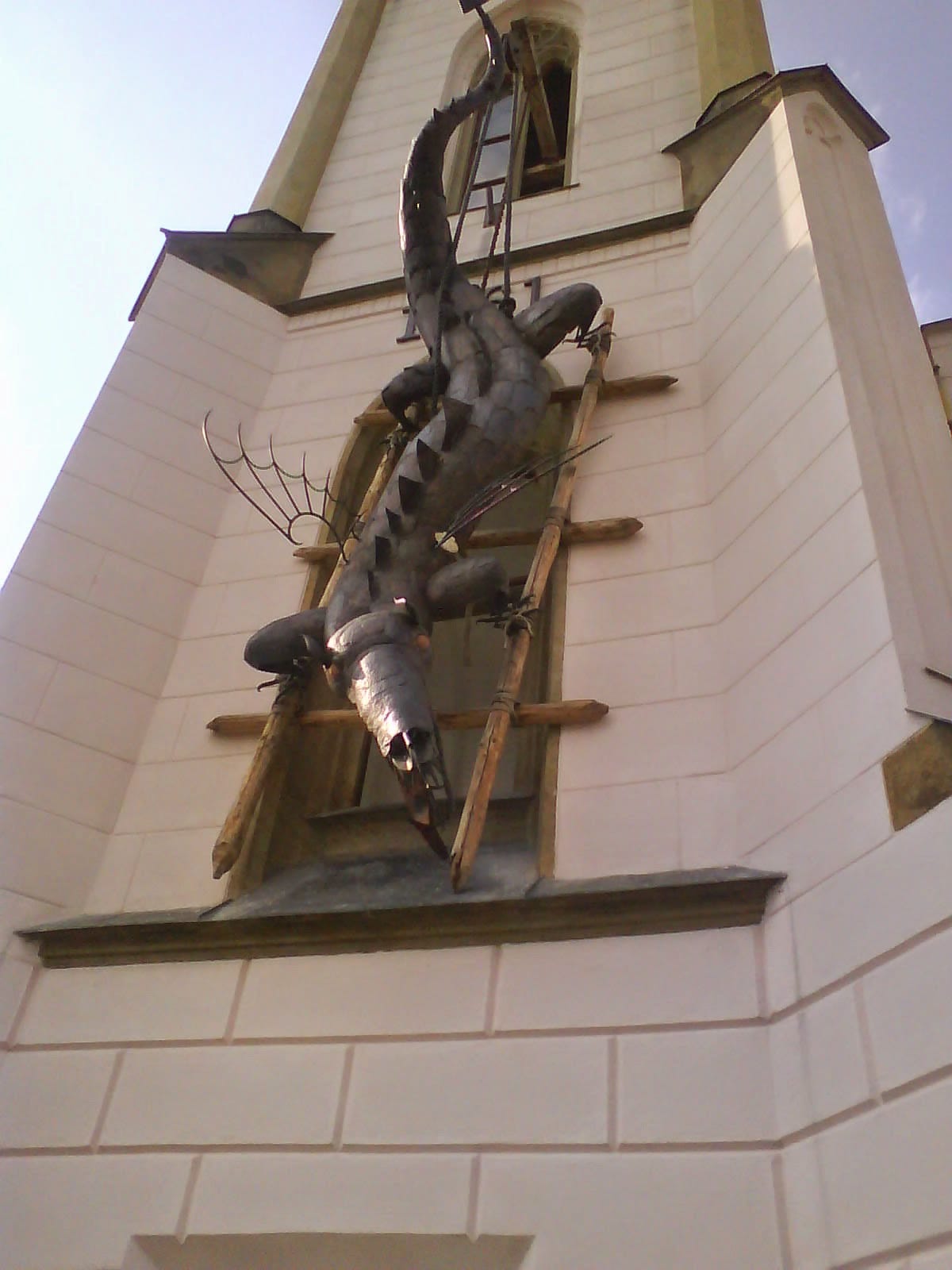Trutnov town square - no letter of safe conduct required
The frustrations of visa application are nothing new. Travellers in the Roman Empire required documentation to prove they were residents of said empire, and by the 13th century, France had something that could, with a bit of imagination, be seen as the ancestor of the modern visa. These early equivalents of a stamp in the back of your passport were intended to allow people safe travel through certain territories and usually took the form of letters of safe conduct or letters of protection issued by a king, lord, bishop, mafiosa, forger, or other authority.
Christian pilgrims tended to bypass the paperwork by adopting that ostentatious pre-visa means of passage - fancy dress. By sporting a long robe, a wide-brimmed hat, and a staff, you communicated to the world that you were a pilgrim. Sadly, dressing up as Gandalf in this manner will not get you across an international border today.
Letters of safe conduct had evolved into something closer to the modern passport by the 16th century. However, the first things to be called visas were issued in 1855 in the UK, granting travelers permission to enter and leave the far-flung territories of the British Empire. Other countries followed suit, formalising their safe-legal-passage systems. The idea caught on as empires and nation states continued to aim cannons and cavalry at each other throughout the 19th and early 20th centuries.
The modern visa system doffs its hat to the League of Nations' Passport Union, founded in 1920 to standardise passports and travel across countries that belonged to the post-World War One League of Nations (the precursor to the United Nations). The Passport Union bogged itself down happily in the deep waters of international travel like a hungry hippo in a muddy lake. The notion of different types of visa based on the purpose of the trip - i.e., tourism, business, or diplomatic matters - was established, along with the time-honoured tradition of visa-less travel for some, and endless bureaucracy for others.
Which brings me to my main theme…
How I switched from temporary to permanent alien
Having endured five years as a temporary resident of Czechia, I was eligible for the unholy grail of a permanent visa. However, as the process involves daunting paperwork, questionnaires, and sitting endlessly in cell-like waiting rooms, I waited two more years for my old passport to expire before plunging back into the visa ordeal established so painstakingly by the League of Nations 100 years earlier. This way, I wouldn’t have to go through the legal wringer for another ten years, and with any luck, I would be dead before then.
Not much had changed in the dark, grey municipal police HQ in Trutnov. The visa and immigration office occupied the building’s second floor, but access was tricky. The foyer contained no clues or instructions, and a locked door stood between me and the visa office. Experience had taught me that, in spite of the office’s international mission, no one here spoke anything other than Czech. For the incomer, the foreigner, the alien, Czech is not the most accommodating of languages. Regardless of what I can read on the page or stumble through in informal conversation, my negotiating skills in the language are, shall we say, shaky.
With no other means of getting the sodding door open, I rang the number on my unfortunately crumpled and coffee-stained confirmation of visa eligibility (defilements that would doubtless be held against me on visa judgment day). No answer, and no alternative numbers on the paper. There was an email, but that seemed a bit message-in-a-bottle, seeing as I was here, now, in the cold foyer. There was also a fax number, which I rang out of interest. The line was dead; but I hope somewhere in a dowdy Trutnov office, a grainy black and white image of my crestfallen face spewed from a dusty fax machine.
A Vietnamese man joined me in the foyer, and we confirmed in broken Czech that a./ the door was locked, b./ this was very frustrating, and c./ my fleeting companion knew several of the fruitier Anglo-Saxon expletives.
Our dilemma was resolved by someone exiting via the locked door (it was one of those that you can buzz open from the inside). We ducked through the reluctant point of ingress like stowaways sneaking aboard the Titanic and trudged to the second floor. My Vietnamese friend was immediately welcomed into one of the five rooms that led from the waiting area, with the admonition that he was late. He mentioned the locked door and lack of access, but his protestations were waved away. This left me alone, and in this state I remained for 20 minutes, after which my Vietnamese friend reappeared, looking crestfallen. He said nothing but goodbye as he slumped back down the stairs. The door he had emerged from was closed, and I was alone again.
As I was dozing and wondering where Magda was (she had arranged to meet me here), my phone rang. It was Magda, asking me to come down and open the door. Reunited, I was able to confirm, via her highly practical native eyes, that none of the doors in the waiting room offered information or consolation. I remembered knocking loudly on one of them last time around and getting a right old telling off. But there seemed little other option than to knock and stir the visa krakens once more.
As I was chivvying my knuckles for the assault, a smiling woman burst from one of the rooms and made a beeline for us. She asked for my passport, which was duly handed over. She and it disappeared behind closed doors.
Was it hours that passed, or was that just my love of exaggeration? When, eventually, the woman reappeared, she returned the passport, handed me some documents, and told us the process was now in review and we would hear something in a few weeks.
All fingers and thumbs
Two months later, I was back in the visa office, dressed as Gandalf on the off-chance that this would hasten my passage through the system. Magda somehow worked out which numbers to press on a keypad outside the toilet block that buzzed the door open, and we poured through with the rekindled hope that we were entering the endgame of the seven-year permanent visa process.
(I wasn’t really dressed as Gandalf, by the way.)
Being the only person harbouring the forlorn hope of residency at 4 pm on this cold Wednesday in March, my wait was minimal. I was ushered into a claustrophobic, white-gloss-painted booth, and the door slammed behind me. Through a glass panel, I could see my stern-faced interlocutor. I stared into the interrogation camera, and it clicked ominously. I saw the interviewer shake her head at the resulting snap. The camera had another go. The head shook again, but this time the captured image of my gaunt face flashed up on the screen in front of me.
“Dobry?”, said the woman, doubtfully.
“Dobry”, I concurred, resisting the urge to apologise for my face, which had clearly not met with her approval. I was then asked to put my fingers, one by one, on the fingerprint reader. With each print, the woman shook her head, muttering the Czech words for “broken” and “not working”. We went through my eight fingertips (no pinkies) twice. The head continued to shake. We tried for a third time, the woman peering through the glass screen to make sure I was using my own fingers.
I had been willing to apologise for my face, but it seemed ridiculous to apologise for my digits. The fingers were scanned a fourth and final time. The head shook, but those 32 prints would have to do. I was released from the booth, and a visa-stamped passport was plonked into my palm.
“Come back next Wednesday at 9 am for the last step in the process”, I was told.
Overflowing once more with fear and foreboding, I complied, this time with Theo as my interpreter, just in case the Czech banter abandoned my linguistic radar, as it so often does.
A nice bit of Trutnov, nowhere near the visa office and KFC
Breakfast and aliens
We managed to get an early morning lift to Trutnov, which saved us 400 crowns on trains and buses, but entailed spending two hours in KFC, as nowhere else within easy reach of the visa office was open. I was pleasantly surprised to find the KFC breakfast includes things such as avocado and egg toast rather than endless variations of the battered battery chicken I’d previously associated the outlet with. Having two hours to explore the menu, we ended up spending more than we would had we opted for the train and bus, but such are the vagaries of travel.
We reached the visa office at 8.50, but the building was locked. We passed through an al fresco corridor of grim-faced smokers and phone-scrollers, all inconvenienced by the unexpectedly locked door. I knew they had all done exactly what I was about to do – pull and push on the door handle with practiced futility – but as I had no wish to doom-scroll or smoke cigarettes, it seemed the only proactive option. It was too cold to skulk by the roadside and wait for events to sweep us along.
As my hand made contact with the handle, someone appeared through the perennially locked internal door. She unlocked and beckoned us in, and Theo and I swept through the foyer and strode through the open inner door, which creaked on its hinges in disapproval at our easy ingress.
Someone met us in the waiting room, and we were ushered immediately into one of the forbidding rooms before the other visa hopefuls had even stubbed out their smokes and pocketed their phones.
In the office, I was handed a plastic card.
“This is your alien ID card”, I was told. “Please check all the details.”
The details were all correct, right down to the ghostly, black-and-white image of my ugly mug.
“All good”, I assured the officer.
“That’s all”, she concluded, with admirable brevity, and as the clock struck nine, we were gone, a mere footnote in the long and painstakingly dull history of visa applications.
Thoroughly alienated, I embarked on my life as a permanent resident. Our first stop in this brave new world was… bloody KFC. We had an hour to wait for the next train to somewhere vaguely close to home, and there was nowhere else selling coffee (the bitter shock of the railway station vending machine having hit home on a previous visit). But, on the positive side, they were still offering the breakfast menu, avocados and all.






